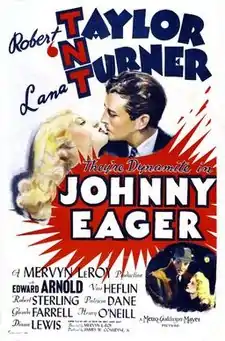Johnny Eager
Johnny Eager is a 1941 film noir directed by Mervyn LeRoy and starring Robert Taylor, Lana Turner and Van Heflin. Heflin won an Academy Award for Best Supporting Actor.[2] The film was one of many spoofed in Dead Men Don't Wear Plaid (1982).
| Johnny Eager | |
|---|---|
 Theatrical release poster | |
| Directed by | Mervyn LeRoy |
| Produced by | John W. Considine Jr. Mervyn LeRoy |
| Screenplay by | John Lee Mahin James Edward Grant |
| Story by | James Edward Grant |
| Starring | Robert Taylor Lana Turner Edward Arnold Van Heflin |
| Music by | Bronislau Kaper |
| Cinematography | Harold Rosson |
| Edited by | Albert Akst |
| Distributed by | Metro-Goldwyn-Mayer |
Release date |
|
Running time | 107 minutes |
| Country | United States |
| Language | English |
| Budget | $651,000[1] |
| Box office | $2,586,000[1] |
Plot
Johnny Eager (Robert Taylor) masquerades as a taxi driver for his gullible parole officer, A. J. Verne (Henry O'Neill), but in reality, he is the ruthless head of a powerful gambling syndicate. Verne introduces him to socialite Lisbeth "Liz" Bard (Lana Turner), a sociology student. Johnny and Liz are attracted to each other, but then he discovers that she is the stepdaughter of his longtime nemesis, John Benson Farrell (Edward Arnold). As a crusading prosecutor, Farrell was responsible for sending Johnny to prison, and now as the district attorney, he has gotten an injunction preventing Johnny's expensive dog racing track from opening.
Johnny decides to use Liz as leverage against her stepfather. When she comes to see him, he has Julio (Paul Stewart), one of his underlings, burst in and pretend to try to kill him. During the faked struggle, Julio drops his gun. Lisbeth picks it up and shoots Julio when he seems to have the upper hand. Johnny then hustles her out of the room before she can realize that the gun is full of blanks and Julio's blood is actually ketchup. Later, Johnny threatens to expose her as a murderer unless Farrell removes the injunction. Farrell gives in.
Johnny is depicted as a man without a conscience. When childhood friend Lew Rankin (Barry Nelson) gets fed up with his subordinate role in the gang and starts plotting against him, Johnny murders him without the slightest qualm. He lies to his devoted girlfriend Garnet (Patricia Dane) to get her to go to Florida while he romances Liz. Mae (Glenda Farrell), a prior girlfriend, asks him to help get her incorruptible policeman husband transferred back to his old precinct because his long commute is straining their marriage. Johnny not only lies, claiming he no longer has any influence, he also hides the fact that he got the man transferred in the first place because he would not look the other way. When Jimmy Courtney (Robert Sterling), Liz's high society former boyfriend, becomes alarmed because Liz is going to pieces due to a guilty conscience, he offers Johnny all his money to leave the country and take Liz with him. Johnny cannot figure out his "angle", why he would do such a selfless thing. In fact, the only soft spot Johnny seems to have is for his intellectual, alcoholic right-hand man, Jeff Hartnett (Van Heflin), and even he is not sure why. Jeff has an insight, telling his boss that "even Johnny Eager has to have one friend."
However, when Johnny learns that Liz intends to turn herself in, he discovers the meaning of love for the first time in his life. He confesses to her that he staged the whole incident, but she does not believe him. To prove his claim, he decides to produce a live Julio, but Julio has defected to Johnny's dissatisfied partner, Bill Halligan (Cy Kendall). Johnny manages to bring Julio (at gunpoint) to Liz, but in the process he shoves Johnny and runs away. Johnny forces Liz and Courtney to flee to safety before the gunfight with Halligan and his men. Eager kills Halligan and Julio, but is spotted by a policeman as he attempts to flee and is shot down. Jeff arrives and embraces Johnny as he finally dies.
The policeman, in a twist of fate, turns out to be Mae's husband.
Cast
|
|
Reception
Box office
According to MGM records the film earned $1,596,000 in the US and Canada and $990,000 elsewhere resulting in a profit of $1,110,000.[1][3]
Critical response
The New York Times film critic called the film "a tight tale of underworld terror that drives hard—even in the clinches" and, though not a "serious drama", "as pure melodrama 'Johnny Eager' moves at a turbulent tempo" .... "Mr. Taylor and Miss Turner strike sparks in their distraught love affair. Van Heflin provides a sardonic portrait of Johnny's Boswell, full of long words and fancy quotations."[4]
Emanuel Levy was less enthused, complaining that the plot "fails to make any sense."[5] However, he complimented Van Heflin for "stealing every scene he is in".[5]
Variety magazine reported, "Johnny Eager is an underworld meller with a few new twists to the usual trappings, but by and large it's the familiar tale ... of slick gangster vs innocent rich girl."[6] However, the reviewer praised all three leads, singling Van Heflin out as "outstanding".[6]
References
- The Eddie Mannix Ledger, Los Angeles: Margaret Herrick Library, Center for Motion Picture Study.
- Johnny Eager at the American Film Institute Catalog.
- "101 Pix Gross in Millions" Variety 6 Jan 1943 p 58
- The New York Times, film review, February 20, 1942; accessed July 11. 2013.
- Emanuel Levy. "Johnny Eager (1942)". Retrieved February 26, 2010.
- "Johnny Eager". Variety.com. January 1, 1941. Retrieved February 26, 2010.
